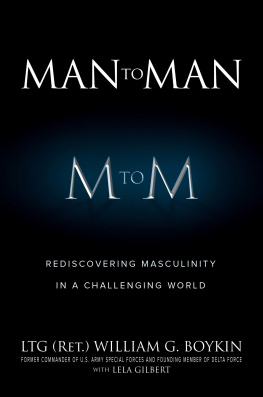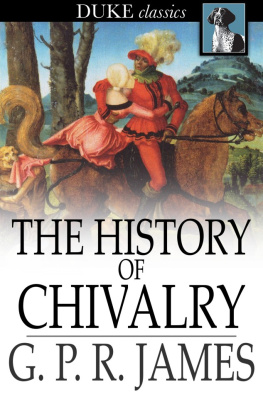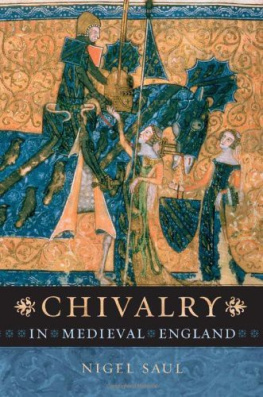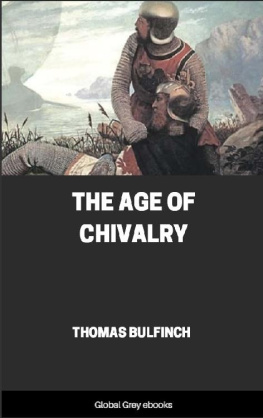Leo Braudy - From Chivalry to Terrorism: War and the Changing Nature of Masculinity
Here you can read online Leo Braudy - From Chivalry to Terrorism: War and the Changing Nature of Masculinity full text of the book (entire story) in english for free. Download pdf and epub, get meaning, cover and reviews about this ebook. year: 2005, publisher: Vintage Books, genre: Romance novel. Description of the work, (preface) as well as reviews are available. Best literature library LitArk.com created for fans of good reading and offers a wide selection of genres:
Romance novel
Science fiction
Adventure
Detective
Science
History
Home and family
Prose
Art
Politics
Computer
Non-fiction
Religion
Business
Children
Humor
Choose a favorite category and find really read worthwhile books. Enjoy immersion in the world of imagination, feel the emotions of the characters or learn something new for yourself, make an fascinating discovery.

- Book:From Chivalry to Terrorism: War and the Changing Nature of Masculinity
- Author:
- Publisher:Vintage Books
- Genre:
- Year:2005
- Rating:5 / 5
- Favourites:Add to favourites
- Your mark:
- 100
- 1
- 2
- 3
- 4
- 5
From Chivalry to Terrorism: War and the Changing Nature of Masculinity: summary, description and annotation
We offer to read an annotation, description, summary or preface (depends on what the author of the book "From Chivalry to Terrorism: War and the Changing Nature of Masculinity" wrote himself). If you haven't found the necessary information about the book — write in the comments, we will try to find it.
Leo Braudy: author's other books
Who wrote From Chivalry to Terrorism: War and the Changing Nature of Masculinity? Find out the surname, the name of the author of the book and a list of all author's works by series.
From Chivalry to Terrorism: War and the Changing Nature of Masculinity — read online for free the complete book (whole text) full work
Below is the text of the book, divided by pages. System saving the place of the last page read, allows you to conveniently read the book "From Chivalry to Terrorism: War and the Changing Nature of Masculinity" online for free, without having to search again every time where you left off. Put a bookmark, and you can go to the page where you finished reading at any time.
Font size:
Interval:
Bookmark:
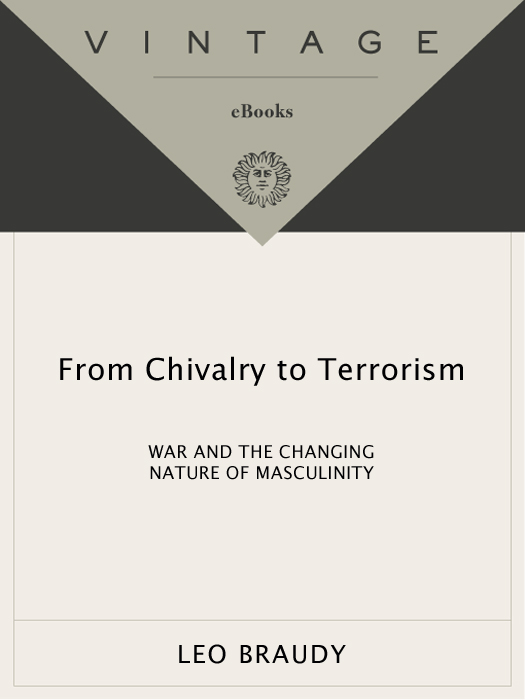
Leo Braudy is University Professor and Bing Professor of English at the University of Southern California. He previously taught at Yale, Columbia, and Johns Hopkins. He has received a Guggenheim Fellowship as well as a Senior Scholar Fellowship from the National Endowment for the Humanities. He has been a fellow at the Rockefeller Foundation at the Villa Ser-belloni in Bellagio, Italy, as well as a writer-in-residence at the American Academy in Rome. His book Jean Renoir: The World of His Films was a finalist for the National Book Award. Another of his books, The Frenzy of Renown: Fame and Its History, was a finalist for the National Book Critics Circle Award. He has written for the New York Times, the Washington Post, and Harpers. Mr. Braudy lives with his wife in Los Angeles.
From Chivalry to Terrorism:
War and the Changing Nature of Masculinity
Native Informant:
Essays on Film, Fiction and Popular Culture
The Frenzy of Renown:
Fame and Its History
The World in a Frame:
What We See in Films
Jean Renoir:
The World of His Films
Narrative Form in History and Fiction:
Hume, Fielding, and Gibbon
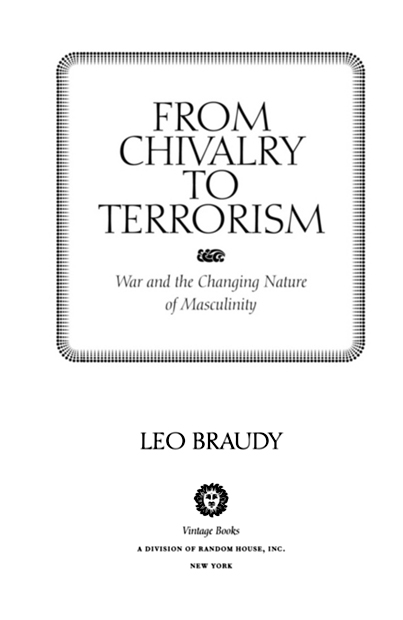
FIRST VINTAGE BOOKS EDITION, APRIL 2005
Copyright 2003 by Leo Braudy
All rights reserved under International and Pan-American Copyright Conventions. Published in the United States by Vintage Books, a division of Random House, Inc., New York, and simultaneously in Canada by Random House of Canada Limited, Toronto. Originally published in hardcover in the United States by Alfred A. Knopf, a division of Random House, Inc., New York, in 2004.
Vintage and colophon are registered trademarks of Random House, Inc.
Grateful acknowledgment is made to Warner Bros. Publications U.S. Inc. for permission to reprint excerpts from the song lyric Remember My Forgotten Man by Al Dubin and Harry Warren. Copyright 1933 (Renewed) by Warner Bros. Inc. Excerpts from the song lyric Strike Up the Band!, music and lyrics by George Gershwin and Ira Gershwin.
Copyright 1927 (Renewed) by WB Music Corp. All rights reserved. Reprinted by permission of Warner Bros. Publications U.S. Inc., Miami, FL 33014.
The Library of Congress has cataloged the Knopf edition as follows:
Braudy, Leo.
From chivalry to terrorism : war and the changing nature of masculinity / Leo Braudy.
p. cm.
1. MenPsychology. 2. MasculinityHistory. 3. WarHistory. 4. War
Psychological aspects. 5. Chivalry. 6. Terrorism. I. Title.
HQ 1090 B 7 2003
305.31dc21 2003044600
eISBN: 978-0-307-77341-8
Author photograph Dorothy Braudy
www.vintagebooks.com
v3.1
For Dorothy
first reader, final
judge, constant support
As for the war,
That is for men.
Hector to Andromache, The Iliad
This book contains much about war and men at war, about wounds, weapons, and death, about soldiers and generals, strategy and tactics, the minute details of logistics and the fog of battlefield terror. But war is not its theme. Instead it is an effort to outline a history of the intertwined ideas of war and masculinity since the Middle Ages, especially, but not exclusively, focused on European and American history.
Near the end of the twentieth century the crisis of masculinity was seen in the chronic tunnel vision of the present as a phenomenon solely of our own time. On the one hand, boxing champion Mike Tyson was convicted of rape; on the other, newspapers reported drastically lowered sperm counts in various countries around the world. President George Bush promised to kick Saddam Husseins ass for his aggression in Kuwait, while after the war the Gulf War syndrome became a national controversy: Were the crippling ailments of veterans caused by chemical and biological weapons, or were they the result of the psychological trauma of being in an unusual wartime situation? Were these soldiers, in other words, warriors injured by governmental deviousness or were they ultrasensitive products of an unmanly age? Male gym memberships were going up. Was it because an improved body image was the only available response to a menaced masculinity? Or because the birth control pill had deprived men of their natural function and all they could do was either hide their heads in shame or jump on the nearest treadmill? Into the new century, in discussions of subjects ranging from wars, natural disasters, and political controversies to tabloid stories like the severing of John Wayne Bobbits penis by his aggrieved wife, a central national and even international drama was phrased invariably in terms of a dubious masculinity. At times modern masculinity was seen as ineffectual; at others, it was threatened and beset; at still others, aggressive and uncivilized.
Compared with the aroused national purpose in response to the terrorist attacks on New York and Washington in September 2001, many of these stories might seem to be the aimless trivia of a society looking for distraction. But that new threat highlighted the confrontation between one kind of war and another: a society of self-anointed holy warriors bent on preserving the exclusive purity of their culture versus a secular society of democratic inclusiveness committed to progress, technological change, and a world political system that was now finding a new set of heroes among policemen, firemen, and other civil servants.
Most of these stories came down to a solemnly familiar issue: What has happened to heroism? But all also invoke a challenge that lies behind that: What has happened to men? Questions of heroism shade imperceptibly into questions of masculinity, which in turn often point to a deep and ongoing confusion over where we are going as a society. Questions of femininity have been news since the advent of modern feminism in the 1960s and 1970s, but it is now also masculinity that attracts the attention of the national and international audience. Talk of the glass ceiling that looms for the aspiring female executive appears in the business section and stories about fairness issues for women appear throughout the paper. But they are now accompanied by other stories of the lost world of male privilege and new male roles in private and public life. That privilege certainly still exists, but many of its supposed beneficiaries nevertheless feel psychologically under siege, and from inside the castle at that. So when an otherwise anonymous young man dives into an icy river to rescue plane crash victims, or when policemen, firefighters, and ordinary citizens spring into action to save lives at the risk of their own, true masculinity appears to be momentarily reborn because men have acted immediately and instinctively to help others.
Some accounts ascribe this erosion in the traditional definition of masculinity to changes in the workplace that have undermined the importance of male labor; others to fear of feminism, feminization, and female power. Still other versions have targeted the effects of technology and mass production or the end of the Cold War.
The technological and cultural pressures on the boundaries and definitions of gender are unprecedented: surgery has been able to shape sexual characteristics in ways that were previously impossible; research into genetics, the mere idea of cloning, has opened up even more chasms in the idea of a stable personal identity. White-collar work and a service economy have expanded enormously, in many communities either replacing or surpassing the industrial and agricultural predominance of the past. At the same time, cultural dichotomies between masculine and feminine have also eroded. The anonymity of the Internet, along with the prevalence of morphing as a technological entertainment device, imply the unsettling possibility that age, gender, and ethnic masquerades that were previously only the fantasies of the scriptwriters of Jekyll-and-Hyde films may now be within the capacity of any eleven-year-old with a computer.
Font size:
Interval:
Bookmark:
Similar books «From Chivalry to Terrorism: War and the Changing Nature of Masculinity»
Look at similar books to From Chivalry to Terrorism: War and the Changing Nature of Masculinity. We have selected literature similar in name and meaning in the hope of providing readers with more options to find new, interesting, not yet read works.
Discussion, reviews of the book From Chivalry to Terrorism: War and the Changing Nature of Masculinity and just readers' own opinions. Leave your comments, write what you think about the work, its meaning or the main characters. Specify what exactly you liked and what you didn't like, and why you think so.

